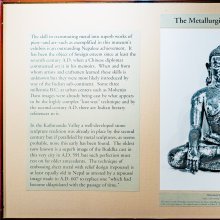Mid: 8 definitions
Introduction:
Mid means something in Hinduism, Sanskrit. If you want to know the exact meaning, history, etymology or English translation of this term then check out the descriptions on this page. Add your comment or reference to a book if you want to contribute to this summary article.
Images (photo gallery)
Languages of India and abroad
Sanskrit dictionary
Source: DDSA: The practical Sanskrit-English dictionaryMid (मिद्).—I. 1 Ā., 4, 1 U. (medate, medyati-te, medayati-te)
1) To be unctuous or greasy.
2) To melt.
3) To be fat.
4) To love, feel affection. -II. I U. (medati-te); see मिथ् (mith).
Source: Cologne Digital Sanskrit Dictionaries: Shabda-Sagara Sanskrit-English DictionaryMid (मिद्).—r. 1st cl. (medati) 1. To be proud. 2. To be humble. r. 10th cl. (medayati-te) (i) midi r. 1st and 10th cls. (mindati mindayati) also (ñi, ā) ñimidā r. 1st cl. (medate) r. 4th cl. (medyati) 1. To be unctuous, to be oily or greasy. 2. To liquefy, to melt. 3. To annoint. 4. To have affection or regard for. 5. To be soft, (literally or figuratively.) (ṛ) midṛ r. 1st cl. (medati-te) 1. To understand. 2. To hurt, to injure. 3. To unite.
Source: Cologne Digital Sanskrit Dictionaries: Benfey Sanskrit-English DictionaryMid (मिद्).—i. 1, [Ātmanepada.], i. 4, medya, [Parasmaipada.], and i. 10, [Parasmaipada.], also † mind Mind, i. 10, [Parasmaipada.] 1. To be unctuous. 2. † To liquefy. † 3. To love. 4. To rejoice (ved.).
— With pra pra, [Causal.] pramedita, Made unctuous; greasy. See mith.
— Cf.
Source: Cologne Digital Sanskrit Dictionaries: Cappeller Sanskrit-English DictionaryMid (मिद्).—madyati (medate) be fat. [Causative] medayati make fat.
Source: Cologne Digital Sanskrit Dictionaries: Monier-Williams Sanskrit-English Dictionary1) Mid (मिद्):—1. mid or med, [class] 1. [Ātmanepada] [Parasmaipada] = √mith (‘to understand’ or ‘to kill’), [Dhātupāṭha xxi, 7.]
2) 2. mid or mind [class] 1. [Ātmanepada] or [class] 4. [Parasmaipada] ([Dhātupāṭha xviii, 3 and xxvi, 133]) medate or medyati (of the former only 3. sg. [imperative] medatām, [Ṛg-veda x, 93, 11]; [perfect tense] mimeda, mimide; [Aorist] amidat, amediṣṭa; [future] meditā, mediṣyati, te; [indeclinable participle] miditvā or meditvā [grammar]; [Passive voice], midyate [impersonal or used impersonally] [Pāṇini 7-3, 82 [Scholiast or Commentator]]),
2) —to grow fat, [Ṛg-veda; Taittirīya-saṃhitā; Brāhmaṇa];—[class] 10. [Parasmaipada] ([Dhātupāṭha xxxii, 8]) mindayati or medayati (cf. [Mahābhārata viii, 1992 and] mitra);—the latter also as [Causal] ‘to make fat’ [Ṛg-veda vi, 28, 6.]
Source: Cologne Digital Sanskrit Dictionaries: Yates Sanskrit-English DictionaryMid (मिद्):—medati 1. a. To be proud or humble. (ṅa) medate 1. d. (ka) medayati 10. a. (ki, ña, i) mindati, yati (ya) medyati 4. a. To be unctuous, to melt, to be soft or kind. (ṝ, ña) medati, te to understand, injure.
[Sanskrit to German]
Sanskrit, also spelled संस्कृतम् (saṃskṛtam), is an ancient language of India commonly seen as the grandmother of the Indo-European language family (even English!). Closely allied with Prakrit and Pali, Sanskrit is more exhaustive in both grammar and terms and has the most extensive collection of literature in the world, greatly surpassing its sister-languages Greek and Latin.
See also (Relevant definitions)
Starts with (+133): Mida, Midacci, Midace, Midaci, Midakanem, Midaki, Midalli, Midam, Midamida, Midamidane, Midate, Midathala, Midauma-baphang, Midava Miravanem-Dakhavinem, Middanqajibu, Midde, Middha, Middhi, Middhin, Middige.
Ends with: Anumid, Pramid, Prasamid, Samid, Thamid, Ummid, Upasamid.
Full-text (+355): Mind, Med, Madhyahna, Divamadhya, Prameditavat, Madhyaditya, Medura, Rashi, Ritu, Yuganta, Anumid, A-mid o-raw a-tyan, Tulamasa, Suina, Samayadhvam, Donaprahara, Shitakala, Madhyalagna, Khadi Dupara, Madhyaratri.
Relevant text
Search found 189 books and stories containing Mid; (plurals include: Mids). You can also click to the full overview containing English textual excerpts. Below are direct links for the most relevant articles:
A Collection of Popular Tales from the Norse and North German (by Peter Christian Asbjørsen)
Tiruvaymoli (Thiruvaimozhi): English translation (by S. Satyamurthi Ayyangar)
Pasuram 5.4.1 < [Section 4 - Fourth Tiruvaymoli (Ur ellam tunci)]
Pasuram 1.5.3 < [Section 5 - Fifth Tiruvaymoli (Vala el ulakil mutalaya)]
Pasuram 1.1.6 < [Section 1 - First Tiruvaymoli (Uyarvu ara Uyar Nalam)]
Maha Prajnaparamita Sastra (by Gelongma Karma Migme Chödrön)
Appendix 3 - Identification of Makara, king of the fish (matsyarāja) < [Chapter XIII - The Buddha-fields]
Part 2.3 - Why celebrate the upavāsa of six days of fasting < [Section II.1 - Morality of the lay person or avadātavasana]
Part 9 - Imitating the bearing of the Buddha < [Chapter LI - Seeing all the Buddha Fields]
Rig Veda (translation and commentary) (by H. H. Wilson)
Blue Annals (deb-ther sngon-po) (by George N. Roerich)
Chapter 3 - Oral Tradition of Saṃvara and the Ras chung pa (Rechungpa) < [Book 8 - The famous Dakpo Kagyü (traditions)]
Chapter 23 - Mind instruction lineage (iii): sna’u bya bral pa < [Book 8 - The famous Dakpo Kagyü (traditions)]
Chapter 10 - Phagmodru Lineage (iv): gcung bcu gnyis pa < [Book 8 - The famous Dakpo Kagyü (traditions)]
Vastu-shastra (5): Temple Architecture (by D. N. Shukla)
Temple architecture in Java and Bali < [Chapter 12 - History of Hindu Temples (Prāsādas and Vimānas)]
Temple architecture in Champa (central and southern Vietnam) < [Chapter 12 - History of Hindu Temples (Prāsādas and Vimānas)]
Temple architecture in Prambanam [Prambanan] < [Chapter 12 - History of Hindu Temples (Prāsādas and Vimānas)]
Related products







